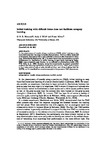Initial training with difficult items does not facilitate category learning
| dc.contributor.author | Edmunds, CER | |
| dc.contributor.author | Wills, Andy | |
| dc.contributor.author | Milton, F | |
| dc.date.accessioned | 2017-08-22T09:25:29Z | |
| dc.date.available | 2017-08-22T09:25:29Z | |
| dc.date.issued | 2018-01-01 | |
| dc.identifier.issn | 1747-0218 | |
| dc.identifier.issn | 1747-0226 | |
| dc.identifier.uri | http://hdl.handle.net/10026.1/9853 | |
| dc.description.abstract |
<jats:p> In the phenomenon of transfer along a continuum (TAC), initial training on easy items facilitates later learning of a harder discrimination. TAC is a widely replicated cross-species phenomenon that is well predicted by certain kinds of associative theory. A recent report of an approximately opposite phenomenon (i.e., facilitation by initial training on hard items) poses a puzzle for such theories, but is predicted by a dual-system model (COVIS). However, across four experiments, we present substantial evidence that this counterintuitive finding was in error. Rather, the result appears to be a false positive and, as such, should not form part of the evidence base for COVIS nor be considered as a counter-example to the pervasive TAC phenomenon. </jats:p> | |
| dc.format.extent | 151-167 | |
| dc.format.medium | Print-Electronic | |
| dc.language | en | |
| dc.language.iso | en | |
| dc.publisher | SAGE Publications | |
| dc.subject | Categorisation | |
| dc.subject | transfer along a continuum | |
| dc.subject | implicit | |
| dc.subject | explicit | |
| dc.title | Initial training with difficult items does not facilitate category learning | |
| dc.type | journal-article | |
| dc.type | Journal Article | |
| plymouth.author-url | https://www.webofscience.com/api/gateway?GWVersion=2&SrcApp=PARTNER_APP&SrcAuth=LinksAMR&KeyUT=WOS:000456681900005&DestLinkType=FullRecord&DestApp=ALL_WOS&UsrCustomerID=11bb513d99f797142bcfeffcc58ea008 | |
| plymouth.issue | 2 | |
| plymouth.volume | 72 | |
| plymouth.publication-status | Published | |
| plymouth.journal | Quarterly Journal of Experimental Psychology | |
| dc.identifier.doi | 10.1080/17470218.2017.1370477 | |
| plymouth.organisational-group | /Plymouth | |
| plymouth.organisational-group | /Plymouth/Admin Group - REF | |
| plymouth.organisational-group | /Plymouth/Admin Group - REF/REF Admin Group - FoH | |
| plymouth.organisational-group | /Plymouth/Faculty of Health | |
| plymouth.organisational-group | /Plymouth/Faculty of Health/School of Psychology | |
| plymouth.organisational-group | /Plymouth/REF 2021 Researchers by UoA | |
| plymouth.organisational-group | /Plymouth/REF 2021 Researchers by UoA/UoA04 Psychology, Psychiatry and Neuroscience | |
| plymouth.organisational-group | /Plymouth/Research Groups | |
| plymouth.organisational-group | /Plymouth/Research Groups/Institute of Health and Community | |
| plymouth.organisational-group | /Plymouth/Users by role | |
| plymouth.organisational-group | /Plymouth/Users by role/Academics | |
| dc.publisher.place | England | |
| dcterms.dateAccepted | 2017-07-12 | |
| dc.rights.embargodate | 2018-8-28 | |
| dc.identifier.eissn | 1747-0226 | |
| dc.rights.embargoperiod | No embargo | |
| rioxxterms.versionofrecord | 10.1080/17470218.2017.1370477 | |
| rioxxterms.licenseref.uri | http://www.rioxx.net/licenses/all-rights-reserved | |
| rioxxterms.licenseref.startdate | 2018-01-01 | |
| rioxxterms.type | Journal Article/Review |


